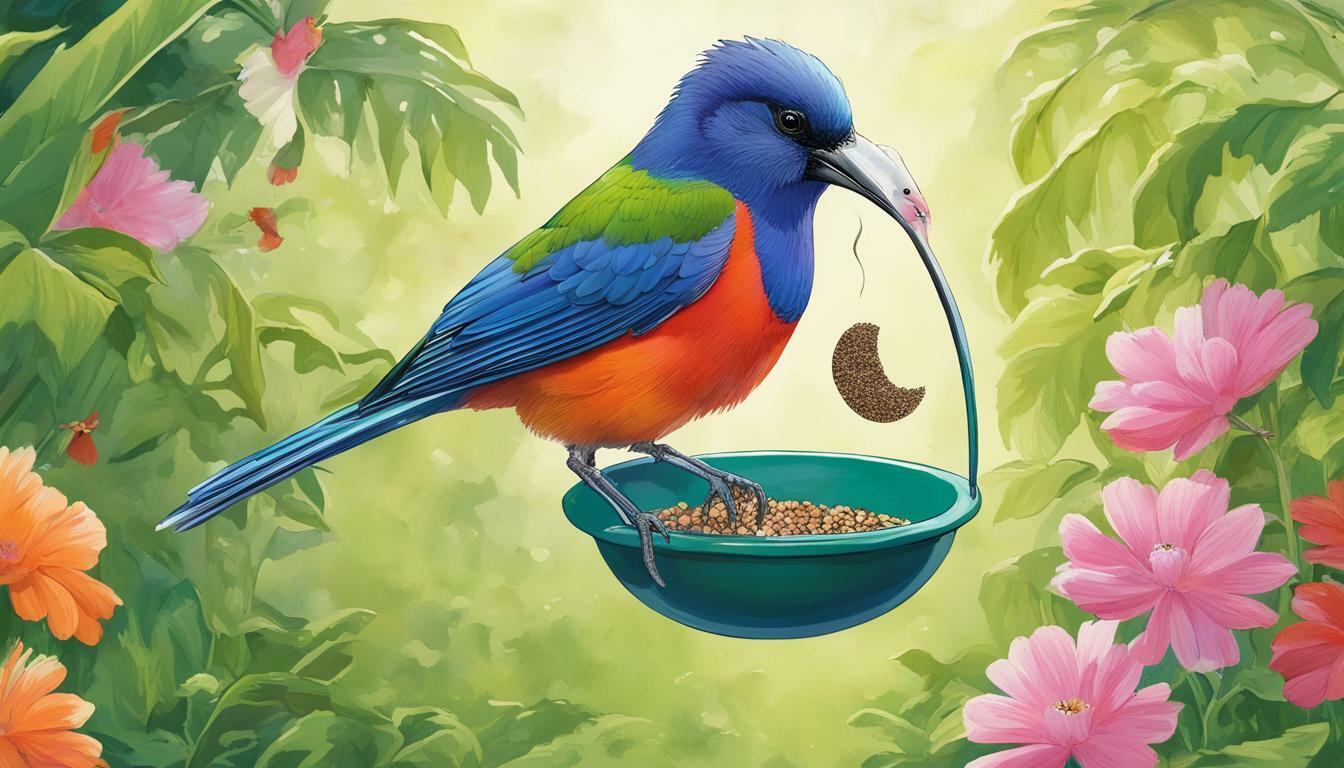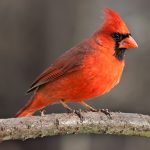Have you ever wondered if the birds that visit your feeder know who is providing them with food? It turns out that bird feeding habits may be linked to their ability to recognize and remember specific individuals.
Bird behavior has been a topic of study for many years, and researchers have discovered that birds have impressive cognitive abilities. Their ability to remember specific feeding locations and patterns suggests that they have a level of cognitive awareness beyond what was previously thought.
Key Takeaways:
- Birds may be able to recognize and remember those who provide them with food
- Bird behavior is linked to their cognitive abilities
- Further research is needed to fully understand the complexity of the bird-human relationship
Bird Feeding Patterns and Avian Social Interactions
Have you ever wondered how bird feeding patterns may influence their social interactions? Birds exhibit a wide range of feeding behaviors, from solitary foraging to communal feeding. These patterns may have implications for how they interact with other birds and potentially with humans as well.
| Bird Feeding Patterns | Examples |
|---|---|
| Solitary | Woodpeckers, nuthatches, and chickadees |
| Competition | Blue jays and squirrels fighting for food |
| Communal | Flocks of birds, such as sparrows and finches, feeding together |
| Aggressive | Hummingbirds chasing off others from their territory |
Some studies suggest that birds may form associations with specific individuals based on their feeding interactions. For example, if a bird consistently receives food from a particular person, it may exhibit a preference or recognition towards them. However, these associations may not necessarily signify a conscious understanding of who is providing food.
It is also important to note that bird feeding patterns may vary by species and location. Some birds may be more social and exhibit stronger bonds with other individuals, while others may be more solitary and focused on individual survival. These factors may also influence their response to human interactions.
Overall, bird feeding patterns and social interactions are complex and multifaceted. While feeding habits may play a role in the bird-human relationship, it is important to consider additional factors such as species-specific traits and avian cognitive abilities.
Avian Cognitive Abilities and Bird-Human Relationship
Studies have shown that birds have remarkable cognitive abilities. They possess complex neural pathways that allow them to recognize, learn, and remember various stimuli.
When it comes to the bird-human relationship, their cognitive abilities play a crucial role in recognizing and forming associations with the humans who provide them with food. Research has shown that birds can differentiate between human faces and voices, and may even recognize specific individuals.
One study conducted by researchers at the University of Vienna found that pigeons can recognize human faces and can even distinguish between familiar and unfamiliar human faces. The study concluded that birds can use their visual memory to recognize and differentiate human faces.
Another study by researchers at the University of California, Davis, found that birds can also recognize human voices. The study examined parrots who were able to recognize their owners’ voices even when the owners were not visibly present.
Furthermore, studies have shown that positive reinforcement, such as consistent feeding, can help build a bond between birds and humans. This bond can lead to increased trust and recognition of specific individuals.
While birds may not have a conscious understanding of who feeds them, their cognitive abilities allow them to form associations and exhibit behaviors that suggest recognition and a bond with their food providers. Further research is needed to fully understand the intricacies of the bird-human relationship.
Observations of Bird Recognition
Birds are known for exhibiting a wide range of behaviors, some of which suggest higher levels of intelligence. Over the years, many bird owners and researchers alike have reported instances of their feathered friends displaying signs of recognition towards specific individuals.
For instance, some birds have been observed following their preferred human around the house or garden, or showing a preference for their presence. Such behaviors suggest that birds can associate people with certain actions, such as feeding or providing companionship.
While some may argue that these behaviors are simply a result of conditioning, others believe that birds possess a natural intelligence that enables them to differentiate between different individuals. Researchers have conducted various studies on bird behavior and intelligence, which have shed light on their cognitive abilities.
One such study conducted at the University of Cambridge found that some birds are capable of recognizing human faces and voices. The study involved training European jays to associate certain human faces with food rewards, and the birds were able to pick out those faces from a group of others they had not seen before.
However, it’s worth noting that not all bird species possess the same cognitive abilities, and some may be more capable of recognizing individuals than others. Additionally, there may be certain visual or auditory cues that birds rely on to recognize people, rather than a conscious understanding.
Nevertheless, the observations of bird recognition suggest that there is a certain degree of cognitive processing happening in their brains. Whether it’s a deeper level of understanding or simply a learned behavior, it’s clear that birds have the capacity to form strong bonds with the humans who feed them and care for them.
Factors Influencing Bird Recognition
There are several factors that may influence bird recognition, including avian cognitive abilities, bird feeding habits, and the overall bird-human relationship.
Studies have shown that some bird species possess impressive cognitive abilities, including the ability to recognize specific individuals based on visual and auditory cues. Additionally, consistent feeding routines may lead to the formation of associations and preferences in birds.
However, certain limitations may hinder bird recognition, such as reliance on visual cues, potential for confusion with other individuals, and the complexity of the bird-human relationship.
It is important to note that while birds may not have a conscious understanding of who feeds them, they can exhibit behaviors that suggest recognition and bond with their food providers. Further research is necessary to fully understand the intricacies of the bird-human relationship.
Bird-Human Relationship: Understanding the Intricacies
Throughout this article, we have explored the behavior, feeding patterns, and cognitive abilities of birds, with a specific focus on their relationship with humans. While birds may not have a conscious understanding of who feeds them, they can form associations and exhibit behaviors that suggest recognition and a bond with their food providers.
The bird-human relationship is complex and multifaceted, influenced by various factors such as species-specific traits, familiarity, and consistency of feeding. However, it is clear that positive reinforcement plays a significant role in the formation of this relationship. A consistent feeding routine can lead to birds associating humans with a reliable source of food and exhibiting behaviors that suggest a recognition of specific individuals.
Despite this, it is important to note that the complexity of the bird-human relationship is not yet fully understood. Further research is needed to gain a deeper understanding of the intricacies of this relationship, including the potential limitations to bird recognition and the specific cognitive abilities that contribute to the formation of this bond.
In conclusion, while the exact nature of the bird-human relationship may remain elusive, it is clear that it is a unique and multifaceted bond. By continuing to study the behavior, feeding patterns, and cognitive abilities of birds, we can gain a deeper understanding of this relationship and the role that positive reinforcement plays in its formation.
Do Chickens Recognize Their Feeders?
Chickens’ feed consumption patterns can reveal whether they recognize their feeders. By closely monitoring the amount of food consumed and the time taken to finish it, researchers can assess if chickens associate specific individuals with feeding. Understanding this behavior can shed light on the social intelligence of chickens and their ability to recognize and interact with different individuals in their environment.
FAQ
Q: Do birds have the ability to recognize who feeds them?
A: While birds may not have a conscious understanding of who feeds them, they can form associations and exhibit behaviors that suggest recognition and a bond with their food providers. Further research is needed to fully understand the intricacies of the bird-human relationship.
Q: How do bird feeding patterns impact their social interactions?
A: Bird feeding patterns may influence their social interactions. It is debated whether birds form associations with specific individuals based on their feeding interactions and if they exhibit any preferences or recognition towards those who consistently provide food.
Q: What is the role of avian cognitive abilities in the bird-human relationship?
A: Avian cognitive abilities play a role in the bird-human relationship. Studies have investigated their recognition of human faces and voices, and positive reinforcement can contribute to forming a bond between birds and humans.
Q: Are there real-life observations of birds displaying recognition towards specific individuals?
A: Yes, there have been observational anecdotes of birds showing signs of recognition towards specific individuals, such as following them or showing a preference for their presence. Consistent feeding routines and other factors may aid in bird recognition.
Q: What factors influence bird recognition?
A: Various factors can influence bird recognition, including species-specific traits, familiarity, and consistency of feeding. Visual cues, auditory stimuli, and the overall complexity of the bird-human relationship may also play a role.











